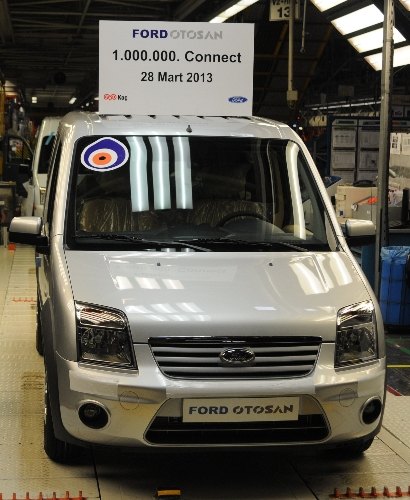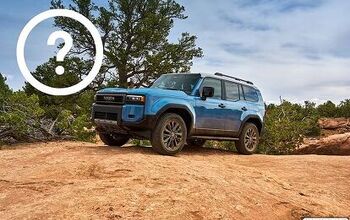U.S. Customs Calls Ford's Importing Transit Connect As Passenger Vehicle 'Manipulation' of Chicken Tax Tariff
Fifty years ago, in a dispute over a German tariff on chicken imported from the United States, the U.S. government retaliated by slapping a 25% tax on imported trucks and vans, apparently to impact the then popular VW Bus. As sales of small trucks from Japan increased, the American automakers embraced the so-called Chicken Tax as a means of reducing competition. However, now that all three American based car companies sell vehicles that have been made outside the United States, the tariff has come back to haunt at least Ford. Automotive News reports that Ford is now appealing a ruling by U.S. Customs and Border Protection that the way the company imports the Transit Connect commercial vehicle makes it subject to the 25% tariff as opposed to the much smaller 2.5% duty charged on small passenger vans.
For the past four years Ford has imported the Transit Connect from it’s Otosan, Turkey plant equipped as passenger vans, paying the lower tariff, but at a contractors facility in the Port of Baltimore before the vans are distributed to dealers the seats are removed (and saved to be offered as an option) and the window glass is replaced with sheet metal. The $23,420 Transit Connect, an economical alternative for a lot of service business and those in the building trades, has found a niche in North American and it would be significantly more expensive with the higher tariff added in. Ford saves thousands of dollars on every Transit Connect by avoiding the Chicken Tax, even after accounting for the cost of building them as passenger vans and then removing the same equipment.
In the Jan. 30 decision USC&BP told Ford, “It is clear that the Connect is a commercial vehicle first and foremost,” in a 13-page ruling, that importing it as a passenger van it “serves no manufacturing or commercial purpose” and that Ford’s process was nothing other than an attempt to “manipulate the tariff schedule.”
Transit Connects at the Port of Baltimore
In saying that the company is appealing the ruling, a Ford spokesman said it contradicts previous decisions by the agency. Ford will continue to import the Transit Connects as it is currently doing and while the appeal process is underway it will be paying the higher tariff. Some Transit Connects are imported already equipped and sold as taxicabs so presumably those still qualify for the lower rate.
The redesigned 2014 Transit Connect will be launched at the end of this year and production will be moved to Ford’s Valencia, Spain operations from Turkey. That’s perhaps one reason why Ford has been lobbying the U.S. government in favor of a free-trade treaty with the EU, of which Turkey is not a full member. Concurrently, Ford is part of an effort by the American Automotive Policy Council, a trade group that represents the Detroit 3 to lobby Congress and U.S. trade negotiators to keep the chicken tax in place against Japanese automakers, saying it should not be phased out for another two or three decades, because of alleged non-tariff barriers to foreign car brands in Japan.
More by TTAC Staff
Latest Car Reviews
Read moreLatest Product Reviews
Read moreRecent Comments
- Analoggrotto I don't see a red car here, how blazing stupid are you people?
- Redapple2 Love the wheels
- Redapple2 Good luck to them. They used to make great cars. 510. 240Z, Sentra SE-R. Maxima. Frontier.
- Joe65688619 Under Ghosn they went through the same short-term bottom-line thinking that GM did in the 80s/90s, and they have not recovered say, to their heyday in the 50s and 60s in terms of market share and innovation. Poor design decisions (a CVT in their front-wheel drive "4-Door Sports Car", model overlap in a poorly performing segment (they never needed the Altima AND the Maxima...what they needed was one vehicle with different drivetrain, including hybrid, to compete with the Accord/Camry, and decontenting their vehicles: My 2012 QX56 (I know, not a Nissan, but the same holds for the Armada) had power rear windows in the cargo area that could vent, a glass hatch on the back door that could be opened separate from the whole liftgate (in such a tall vehicle, kinda essential if you have it in a garage and want to load the trunk without having to open the garage door to make room for the lift gate), a nice driver's side folding armrest, and a few other quality-of-life details absent from my 2018 QX80. In a competitive market this attention to detai is can be the differentiator that sell cars. Now they are caught in the middle of the market, competing more with Hyundai and Kia and selling discounted vehicles near the same price points, but losing money on them. They invested also invested a lot in niche platforms. The Leaf was one of the first full EVs, but never really evolved. They misjudged the market - luxury EVs are selling, small budget models not so much. Variable compression engines offering little in terms of real-world power or tech, let a lot of complexity that is leading to higher failure rates. Aside from the Z and GT-R (low volume models), not much forced induction (whether your a fan or not, look at what Honda did with the CR-V and Acura RDX - same chassis, slap a turbo on it, make it nicer inside, and now you can sell it as a semi-premium brand with higher markup). That said, I do believe they retain the technical and engineering capability to do far better. About time management realized they need to make smarter investments and understand their markets better.
- Kwik_Shift_Pro4X Off-road fluff on vehicles that should not be off road needs to die.




































Comments
Join the conversation
Yeah....Really? While I may agree,and other times,not, with DenverMike. We are certainly not the same person. In my somewhat limited education I was taught "English" spelling. This won't come as a shock to most the B&B. Spelling,and grammer are not my strong points. I have learned,that while Trolls can be quite entertaining, it best to just ignore them
@ DenverMike....I just read through some of the comments. I'm just blown away. Just you know my position. I'm a proud Canadian,and I'm very comfortble,with our relationship with the good people of the USA. I for one sleep better at night, in the knowledge that the might of the US military, has our back. In Canada,we do things a little different. That's not to say better, just different. Like the USA and Oz, our political system in Canada breeds nut cases from the far/loony left, and from the far right. The good news is , that not many get elected. BAFO and Lou_.... As a gentleman,I'm going to ask you two to address me as "Mikey" and "DenverMike" by his proper handle.